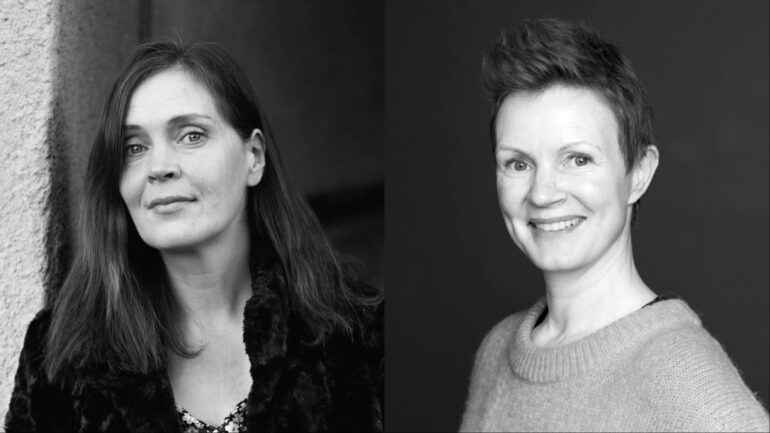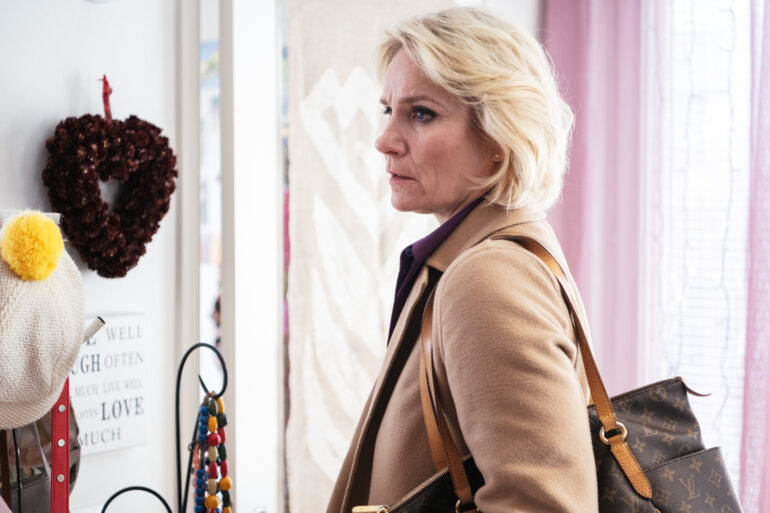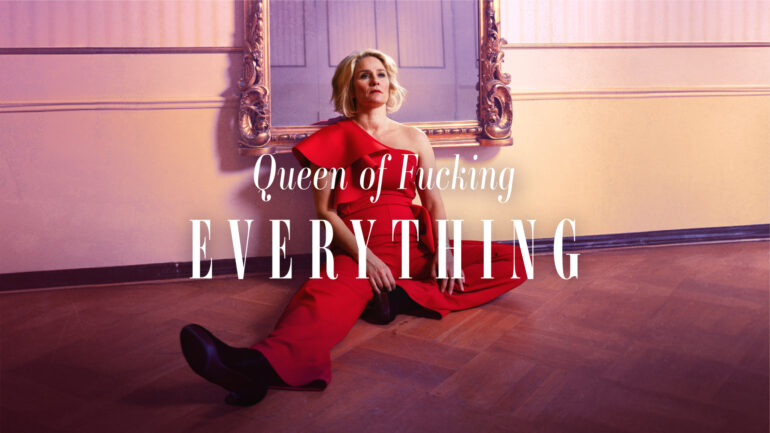Written by: Marta Balaga
20.03.25
Writer-director Tiina Lymi and producer Minna Haapkylä, the duo behind Finnish hit series Queen of Fucking Everything, on how a vision succeeds.
Queen of Fucking Everything, the Finnish crime series with a dark sense of humour, premiered on Yle to the best opening week numbers of all time. The series has 9 million clicks on Yle’s player and more than 0,8 million have watched it from beginning to end.
The story focuses on real estate agent Linda (Laura Malmivaara), whose husband suddenly disappears – the only thing left is his massive debt. Unable – and unwilling – to let go of her lifestyle, Linda turns to crime. And she’s actually very good at it.
The six-episode series has been acquired by ZDF, NPO, VRT, NRK and RÚV. It’s produced by Minna Haapkylä, Tiina-Mari Pitkänen and Olli Suominen for Rabbit Film, which also handles sales, and created and directed by Tiina Lymi. Already a Jussi-winning actor, Lymi recently directed – and wrote – Finland’s biggest 2024 box-office hit, historical drama Stormskerry Maja (Stormskärs Maja). As reported by NFTVF, the film outperformed Inside Out 2 and Deadpool & Wolverine in Finland, breaking records with 470,000 admissions.
Tiina, you had a massive box-office success with Stormskerry Maja, and now Queen of Fucking Everything show record numbers as well. Why do you think these stories, which are so different, spoke to the viewers?
Tiina Lymi (TL): Maybe I just get things done.
Minna Haapkylä (MH): Or maybe you just have talent.
TL: I surrounded myself with a wonderful cast and team, but one thing I know for sure: Every time I had artistic freedom and trust from the producers, things would work out. It was the case with Welfare Warriors (Sisäilmaa) [TV series Lymi directed and co-wrote with Juha Lehtola], Stormskerry Maja and now with Queen of Fucking Everything. I’m not saying that this kind of freedom means you get all the money in the world and can do whatever you like, but you are able to follow your instinct. I’ve been around for quite a few years. I could see up close that when you can’t complete your vision, things break down. If a producer, or a financier, has trust in someone’s talent, there’s a possibility of success.
MH: It’s important not just to have freedom, but also to have dialogue. You have to make sure you understand what your collaborator is doing and what you are doing together – only then you can support them. As a producer, you can’t just say: “Do what you want, I don’t care, and here’s the money.”
For so many years, people have been saying that female-led stories “don’t make money” and that the likes of Mamma Mia! or Barbie are just exceptions. Stormskerry Maja and Queen both have female leads.
TL: In the case of Maja, it’s also a classic book. Nobody has read it, but everyone knows about it [laughter]. There was a TV series [in the 1970s]. It has been proven that it touches Finnish hearts. In the case of this show, well… Let’s say that it’s very authentic. It’s something that hasn’t been done in Finland, or at least I haven’t seen it.
There has been some backlash to it too, and it was very interesting to see. Women are allowed to do things, but if they do really big things, the whole nation reacts. I’ve gotten hate mail. I don’t know how many female directors and writers have approached financiers with big, even epic ideas. And how many have been told no. We live in the Nordics, where the society is very equal – at least on paper. But the misogyny and the lack of trust in female artists is still very strong.
MH: In both of these stories female protagonists are very strong, but they also struggle with love and money. That’s something many Finns can relate to. I just had a conversation yesterday, with a man, who said: “I relate to Linda.” We, women, and all the minorities, are used to seeing ourselves in male characters. We go: “It’s Sylvester Stallone and he’s struggling, and I can relate to his story.” Men used to think they were unable to do that, unable to follow a woman. It has changed now, I think. Men have imagination too. They can relate to female characters, to Linda’s money issues and hunger for power.
TL: I was born in 1971, and all we had was Ronia, the Robber’s Daughter and Pippi Longstocking. The characters who were holding a sword and making all the decisions were always male. It’s nice to relate to someone who’s similar to you, who looks the same way and maybe thinks the same way. But women are not a minority. We make up half of the population, and yet we have struggled to see ourselves as leading characters in film, TV, novels or plays. We’ve been waiting for it.
What makes me really happy is when you look at the statistics and see we have viewers who are in their 20s and in their 80s, and as many women as men. Men relate to Linda like we have related to male characters all our lives.
Is it because she’s not perfect?
TL: That part also irritates people. It’s a minority, but it’s an angry minority, complaining that she’s immoral and rude. She does things you shouldn’t do, but she’s no Michael Corleone! Still, he was a man – he could do bad things. Also, Linda is a loner. Love is not her priority and still it seems that she’s winning.
I didn’t write a “female” character, I just wrote a character. She’s a person. I would also like to be a director and a writer, not a female director and a female writer. But we are not there yet.
Despite all the darkness it’s a funny show and one that comes with its own specific universe. Everything, and everyone, is a bit exaggerated. Are you interested in world-building?
TL: According to my experience, you need to create your own universe and then stick to its rules. My job, as a director and writer, is to protect them. My background is in theatre, so I like “proper” acting: Big things happen in the series, so big things can also happen acting-wise. You just need to be very precise and make sure all these chords are harmonious. And then invite others to join you.
To join you in the world where a shady guy wants to be paid in olive oil and chocolate?
TL: He likes olive oil and chocolate, and they are expensive. Although in my case, I would demand milk chocolate.
Minna, do you think Queen’s success will encourage you to keep on pursuing shows that are different from these ubiquitous Nordic Noirs? Summer of Sorrow (Munkkivuori) was another example of that.
MH: I have no interest in Nordic Noir, or at least in crime shows you can immediately recognise. When I get another script about an alcoholic police officer... I mean, who still writes these things?! Recently, we were pitching in London and it was all about crime. Except for our new show, Aftershave.
It’s not like I’m looking for shows that are different: I look for talented people who have a story to tell, and I try to protect it. That’s my job: to sell it, to pitch it and then protect it. Their words are our biggest asset.
TL: There are so many rules still in place, and we should allow ourselves to be freer, also creatively, while making sure there’s this constant feedback. When Minna says: “I don’t understand it,” that’s useful. It means I have to write this scene better or leave things out in the edit. It’s nice to be free, because this whole train weighs a ton, but you also have to control it. It can’t suddenly leave the station, with you running after it. Nothing good comes out of that.
Would you like to continue Linda’s story?
MH: Mentally, we are prepared for three seasons. We are waiting for Yle to commission the second one. Nobody knows what will happen, but we left things on a cliffhanger.
TL: It’s not the kind of story you could continue forever. It definitely has an ending. And then they live unhappily ever after [laughter]. It’s interesting, because Maja was about love: this unconditional, beautiful love that carries you. This show is about love that doesn’t exist at all. Nobody carries you. The world does not carry you. It just kicks you in the head. Soon, I think I will get that whole loveless topic out of my system. But there are still so many things to say about it.
Official trailer:


